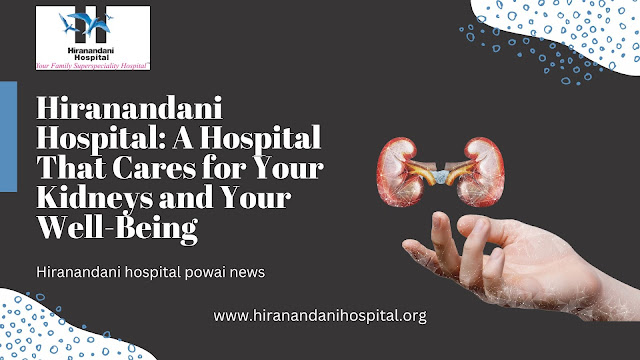Kidney Transplants: What to Expect and How to Prepare - Hiranandani Hospital Kidney
Kidney transplantation is a life-changing medical procedure that offers a renewed chance at a healthier, more fulfilling life for individuals with end-stage renal disease (ESRD). This complex yet transformative process involves the surgical placement of a healthy kidney from a living or deceased donor into the recipient’s body. In this blog post, we will explore what to expect during the kidney transplant journey and how to adequately prepare for this significant medical procedure.
Understanding the Need for Kidney Transplants
End-stage renal disease occurs when the kidneys can no longer function effectively, leading to a buildup of toxins and waste in the body. Kidney transplantation becomes a viable option when other treatments, such as dialysis, are no longer sufficient to maintain health and well-being. The procedure offers a chance for a more normal and active life, free from the constraints of ongoing dialysis.
The Transplant Evaluation Process
Before embarking on the Hiranandani Hospital kidney care journey, individuals undergo a thorough evaluation to assess their eligibility and compatibility for the procedure. This process typically involves:
- Medical Evaluation: A comprehensive medical assessment is conducted to evaluate the overall health of the potential recipient. This includes a review of medical history, current health status, and any existing medical conditions.
- Psychosocial Evaluation: The transplant team assesses the emotional and psychological readiness of the candidate. This evaluation ensures that the individual is mentally prepared for the challenges and lifestyle changes associated with post-transplant care.
Know More :- Hiranandani Hospital Kidney Care
Blood and Tissue Typing: Matching blood and tissue types between the donor and recipient is crucial for a successful transplant. Compatibility increases the likelihood of a positive outcome and reduces the risk of rejection.
- Crossmatching: This test determines whether the recipient’s immune system will react to the donor organ. A negative crossmatch result indicates a lower risk of rejection.
- Infectious Disease Screening: Candidates are screened for infectious diseases to minimize the risk of post-transplant complications.
Preparing for Kidney Transplant Surgery
Once a suitable donor is identified, and the Hiranandani Hospital Kidney transplant team determines that the candidate is a good fit for the procedure, preparations for the surgery begin. Here’s what individuals can expect as they get ready for kidney transplantation:
- Pre-Transplant Education: Candidates and their families undergo comprehensive education about the transplant process, including pre- and post-operative care, potential risks, and lifestyle changes.
- Financial and Insurance Planning: Understanding the financial aspects of transplantation is crucial. This includes discussions about insurance coverage, potential costs, and available financial support.
- Living Donor Coordination (if applicable): For living donor transplants, coordination between the donor and recipient is essential. Living donors undergo their own evaluation process to ensure their suitability for donation.
- Preoperative Tests and Screenings: In the days leading up to the transplant, candidates undergo final tests and screenings to ensure their overall health and readiness for surgery.
The Kidney Transplant Procedure
The day of the kidney transplant is a significant milestone in the journey toward improved health. The surgical procedure typically follows these steps:
- Anaesthesia: The recipient is administered general anaesthesia to ensure a pain-free and comfortable experience during the surgery.
- Incision: The surgeon makes an incision in the lower abdomen to access the recipient’s damaged kidneys.
- Vascular Connection: The donor kidney is connected to the recipient’s blood vessels, allowing for proper blood flow.
- Ureter Connection: The ureter, which carries urine from the kidney to the bladder, is connected to the recipient’s bladder.
- Closing Incisions: Once the connections are secure, the surgeon closes the incisions, and the transplant is complete.
Recovery and Post-Transplant Care
After the successful kidney transplant, the recovery process and post-transplant care become paramount for a positive outcome. Here’s what recipients can expect:
- Hospital Stay: Recipients typically spend several days in the hospital post-transplant for close monitoring and recovery.
- Immunosuppressive Medications: To prevent rejection of the new kidney, recipients must take immunosuppressive medications as prescribed by their healthcare team.
- Follow-up Appointments: Regular follow-up appointments with the transplant team are scheduled to monitor the recipient’s progress and adjust medications as needed.
- Lifestyle Changes: Recipients are advised to make lifestyle changes, including a healthy diet, regular exercise, and avoiding tobacco and excessive alcohol consumption.
- Monitoring for Complications: Ongoing monitoring helps identify and address any potential complications, such as infections or rejection episodes, promptly.
Emotional and Social Support
The kidney transplant journey is not just a physical transformation; it also brings about emotional and social changes. It’s crucial for recipients to have a strong support system in place, including friends, family, and support groups. The emotional well-being of the recipient plays a significant role in the overall success of the transplant.
Conclusion
Hiranandani Hospital Kidney transplant is a life-saving procedure that offers hope and a new beginning for individuals with end-stage renal disease. Understanding what to expect and adequately preparing for the transplant journey are crucial steps toward a successful outcome. With advancements in medical technology and the dedication of healthcare professionals, kidney transplantation continues to provide a path to a healthier and more fulfilling life for many. If you or someone you know is considering a kidney transplant, consult with a healthcare professional to explore the possibilities and embark on this transformative journey toward improved kidney health and overall well-being.



Comments
Post a Comment